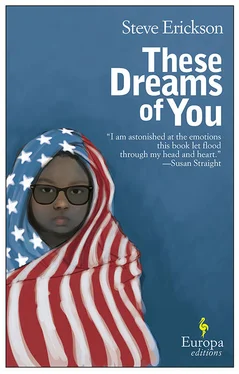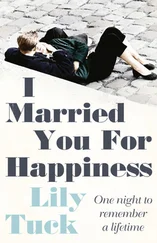Zan would find Molly’s mysteriousness, and all the mysteries that her mysteriousness engenders, more purely irritating if it weren’t for the sense he has — which has grown as surely as the transmissions from Molly’s and Sheba’s bodies together — that the woman is haunted. Or she is more than haunted, she’s branded by a secret, and all that lies between her and her secret is everything about her that’s so indefinite. There’s no way for him to know if Molly has come to Sheba to try and live down this secret or to try and draw closer to a resolution; but this is the one thing about her that Zan knows is no accident, even among all his other conjectures, the most prominent of which is whether, for all concerned, hers is a secret to either be unlocked, or locked away for good.
At the hotel, he carries his daughter up to the room and lays her down in the larger bed. For a while Parker plunders cyberspace on his father’s laptop. Sheba sleeps what her brother calls the zombie sleep, eyes not fully shut, lids only half lowered; the distant music that the girl transmits rises off her sleeping body like steam off a summer sidewalk. Brushing Sheba’s hair from her eyes, Zan is reminded that he promised Viv to find a salon for her in London, and that reminds him to check his email where, after the long day, he feels certain there will be a message. When there isn’t, it’s all the more of a shock.
Zan turns from the laptop and looks at his daughter where she sleeps, noting how the girl was different today with Molly, less manic, tethered to something or someone she’s never been before. Two hours later, unaware that he’s fallen asleep, Zan wakes to the sound of weeping.
Sheba isn’t in the bed next to him. The sound of crying comes from the bathroom where the door is closed.
In the dark Zan rises from the bed, looks over at Parker, goes to the bathroom where the door is locked. “Sheba,” he calls through the door.
“Go away,” comes a little voice.
“Sheba.”
“Leave me alone.”
“What’s wrong?”
“Leave me alone.”
“What is it?”
“Leave me alone.”
“Sheba, open the door.”
For half a moment he wonders if he should leave her but he says, “Sheba. Did you have a bad dream?” She just cries. “Sheba?”
“No.”
“Did you have a bad dream?”
“No.”
“You have to let me in.”
He hears her unlock the door.
She’s sitting on the bathroom floor. Because he’s still only half conscious and his brain is full of vodka, Viv, Molly, J. Willkie Brown and Ronnie Jack Flowers, he belatedly registers that this is something new, the four-year-old sitting on the bathroom floor crying, and that this is not crying for attention, this is crying in private, the way grown-ups do when they want no one to know. She looks up at him. “You don’t love me as much as Parker,” she says simply.
“Sheba,” he says.
“You can’t.” It’s not even an accusation. It’s worse, what the girl considers a realization.
“That’s not true,” Zan says.
“You can’t ,” she repeats, as though begging him just to confirm it.
“It’s not true,” he says firmly, and bends down to pick her up.
For a moment he has her, pulling her to him, when she explodes and pushes him away. “It is true! It is true! Congratulations, Parker!” she calls into the dark of the next room, “bravo! They love you more! What the hell is wrong with you people? Why did you bring me from Thyopia,” as she calls it, the only thing she says now that remotely sounds like a four-year-old, “if you can’t love me as much as Parker? I want to be back in Thyopia where I was born and not here with some old family that’s just mean to me and rude. I would rather live in Thyopia for the rest of my life. Why didn’t you adopt a white daughter? This isn’t my real family, I was never in Mama’s fucked-up tummy! What the hell do you want from me? I hate you all! You don’t pay any fucked-up attention to me anyway! I know why Mama went back — to make them trade another kid for me! Some fucked-up white kid! What do you want with me anyway? I’ll put the hurt on you, young man!” she warns him. “You can’t tell me what to do! I’m a professional! You left me in the car! You can’t tell me. . you can’t. . ” and then, exhausted, “I’m sorry,” she begins to sob, “Poppy, I’m sorry,” pleading, “I’m only four, I’m not twelve like Parker, I act braver than I am. . I don’t. . ” and she speaks as though from somewhere out of time, from some vantage point out of age, seeing herself in a way that Zan never knew a four-year-old could see herself, talking about herself as Zan might or another grown up. “I’m sorry,” sobbing, “Poppy. . ”
Zan sweeps her into his arms more determinedly than any time since he first swept her out of the backseat of the car bringing her home from the airport, and says, “Shhh, shhh, listen to me,” he clutches her to his chest and she squeezes his neck, “listen to me. Are you listening?”
A muffled reply comes from his shoulder.
“I love you. You’re my little girl. I love you and Parker the same. Mama loves you and Parker the same. You’re a member of this family and always will be. It will never, ever, ever change.”
“Promise?” muffled from his shoulder.
“I promise. It will never ever change no matter what you do or say, you’re part of this family forever, whether you want to be or not,” he declares.
“What about my Thyopia poppy?” she peeps from his chest.
“He’s your poppy too. But so am I.”
“Two poppys.”
“Yes.”
“I’m sorry,” she begins to cry again.
“No, shhh. Nothing to be sorry for.”
Sitting up, Parker watches them from his bed. “Sheesh,” he says.
“YOU SHUT UP, PARKER!” Sheba bellows over Zan’s shoulder.
“Parker, go to sleep,” says Zan.
Parker plops his head back down on the pillow. “Who can sleep?”
Almost instantly Sheba is out, snoring in the other bed. Parker doesn’t groan in protest because he has a vested interest in his sister sleeping, and then from the bed he rises to retrieve his father’s laptop. “What are you doing?” says Zan.
“I want to film her sleeping,” the boy says. “She says she never snores. She’s got the zombie eyes, which creep me out but would be über-tight to have a movie of.”
“Go back to bed,” Zan says. For a few minutes the father and son sit watching the girl and listening; Zan looks at Parker. Hesitantly, sensing an opportunity in the quiet of the night, Zan begins, “Uh, Parker, listen. . ”
“The heck, Zan,” the boy says, “we’re not going to have the Talk, are we?” and retreats back to beneath his pillow.
They wait for Viv. It seems clear to Zan that something is wrong. From his cell phone, he never reaches anyone in Ethiopia, as if the country at the beginning of time is inside its own time; and whatever information Molly ever had about Viv only becomes more vague like the rest of Molly, who becomes more enervated and remote.
The morning after her midnight explosion, calmly Sheba tries to explain to her father. “I have to let out the fear. The fear comes in,” she inhales, “it must go out.”
Zan would fire Molly except that, besides the fact he needs a nanny, he can’t bring himself to sever the only person who’s claimed recent contact with Viv, however speciously. Moreover there’s Sheba’s growing attraction to her — a manifestation, maybe, of all the coming conflicts over identity. As the little black girl becomes more racially conscious in her white family, is it a function of a larger dislocation having to do with orphanhood, or in fact is there no dislocation larger than the racial, including orphanhood?
Читать дальше











